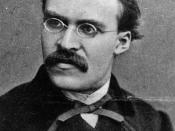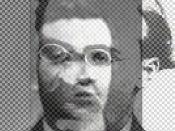Nietzsche begins the second essay by presenting the question of our ability to make promises as a breed of animal, "Is this not the paradoxical task that nature has set itself in the case of man?" He also introduces the opposing force of promise making as forgetfulness, and defining it as an active force of repression. The emphasis at this point in the essay is centered on the need to secure a promise by not allowing the passage of time to wipe our memory of the promise. This allows one to build a sense of courage and stewardship that others can count on to fulfill the promise, this leads to a society that is predictable in their beliefs of fulfillment in the formation of responsibility.
In section 2, Nietzsche turns to responsibility and its origination. The task of breeding an animal with the right to make promises is determined by the regular and somewhat calculable, a process symbolized by the tree and the fruit it bears.
This ability to make promises is not bound by what is socially acceptable, rather by the free will of each sovereign individual. Each sovereign individual therefore is faced with the daunting task being free to make promises, accepting responsibility for future repercussions if those promises go unfulfilled or forgotten. The concept of guilt and "bad conscience" is then identified through these failures.
Nietzsche also touches on the idea of creating a memory for the human animal, and how "one can impress something on this partly obtuse, partly flighty mind, attuned only to the passing moment, in such a way that it will stay there". The relation between memory and hurt is then found; using examples of men being serious and having the presence of a solid memory when hurt or pain is incurred. Historically,


